Related Research Articles

Jawaharlal Nehru was an Indian anti-colonial nationalist, secular humanist, social democrat, statesman and author who was a central figure in India during the middle of the 20th century. Nehru was a principal leader of the Indian nationalist movement in the 1930s and 1940s. Upon India's independence in 1947, he became the first Prime Minister of India, serving for 16 years. Nehru promoted parliamentary democracy, secularism, and science and technology during the 1950s, powerfully influencing India's arc as a modern nation. In international affairs, he steered India clear of the two blocs of the Cold War. A well-regarded author, his books written in prison, such as Letters from a Father to His Daughter (1929), Glimpses of World History (1934), An Autobiography (1936), and The Discovery of India (1946), have been read around the world. The honorific Pandit has been commonly applied before his name.
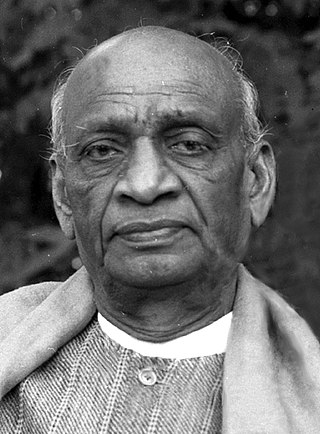
Vallabhbhai Jhaverbhai Patel, commonly known as Sardar Patel, was an Indian lawyer, influential political leader, barrister and statesman who served as the first Deputy Prime Minister and Home Minister of India from 1947 to 1950. He was a barrister and a senior leader of the Indian National Congress, who played a leading role in the country's struggle for independence, guiding its integration into a united, independent nation. In India and elsewhere, he was often called Sardar, meaning "chief" in Hindi, Urdu, Bengali and Persian. He acted as the Home Minister during the political integration of India and the Indo-Pakistani War of 1947.

Mahadev Haribhai Desai was an Indian independence activist, scholar and writer best remembered as Mahatma Gandhi's personal secretary. He has variously been described as "Gandhi's Boswell, a Plato to Gandhi's Socrates, as well as an Ānanda to Gandhi's Buddha".

Feroze Gandhi was an Indian freedom fighter, politician and journalist.

The Non-cooperation movement was a political campaign launched on 1 September 1920, by Mahatma Gandhi to have Indians revoke their cooperation from the British government, with the aim of persuading them to grant self-governance.
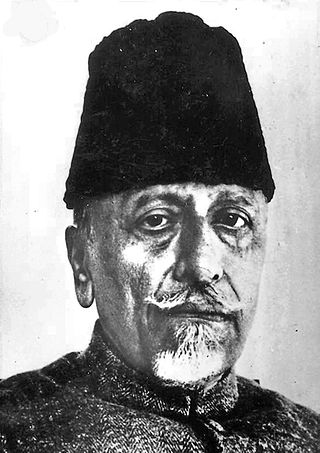
Abul Kalam Ghulam Muhiyuddin Ahmed bin Khairuddin Al-Hussaini Azad was an Indian independence activist, Islamic theologian, writer and a senior leader of the Indian National Congress. Following India's independence, he became the First Minister of Education in the Indian government. He is commonly remembered as Maulana Azad; the word Maulana is an honorific meaning 'Our Master' and he had adopted Azad (Free) as his pen name. His contribution to establishing the education foundation in India is recognised by celebrating his birthday as National Education Day across India.

Motilal Nehru was an Indian lawyer, activist and politician belonging to the Indian National Congress. He also served as the Congress President twice, 1919–1920 and 1928–1929. He was a patriarch of the Nehru-Gandhi family and the father of Jawaharlal Nehru, the first Prime Minister of India.
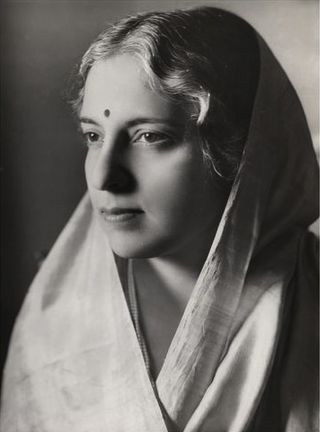
Vijaya Lakshmi Pandit was an Indian freedom fighter, diplomat and politician. She served as the 8th President of the United Nations General Assembly from 1953 to 1954, the first woman appointed to either post. She was also the 6th Governor of Maharashtra from 1962 to 1964. Noted for her participation in the Indian independence movement, she was jailed several times during the movement.

Kamala Nehru was an Indian independence activist and the wife of Jawaharlal Nehru, the first Prime Minister of India. Her daughter Indira Gandhi was the first female Prime Minister of India.
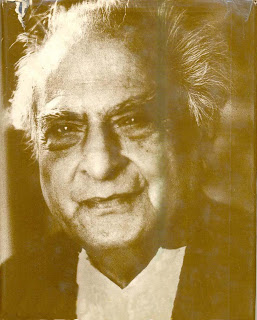
Parmeshwar Narayan Haksar was an Indian bureaucrat and diplomat, best known for his two-year stint as Prime Minister Indira Gandhi's principal secretary (1971–73). In that role, Haksar was the chief strategist and policy adviser behind his inexperienced prime minister's rise to near-absolute power in the mid-1970s. After this he was appointed deputy chairman of the Planning Commission and then the first-ever chancellor of New Delhi's Jawaharlal Nehru University.
Mahavir Tyagi was a prominent Indian independence fighter and parliamentarian from Dehra Dun, Uttar Pradesh India.
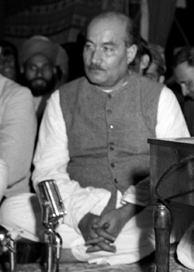
Josh Malihabadi popularly known as Shayar-e-Inqalab was a Pakistani poet and is regarded as one of the finest Urdu poets of the era of British India. Known for his liberal values and challenging the established order, he wrote over 100,000 couplets and more than 1,000 rubaiyat in his lifetime. His wrote Yaadon ki Barat, his autobiography which is noted for its frank and candid style. The first Prime Minister of India, Jawaharlal Nehru held him in high esteem and frequently attended the mushaira at Lala Kishan Lal Kalra's United Coffee House where Josh performed.
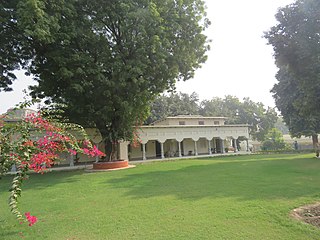
Swaraj Bhavan is a large mansion located in Prayagraj India, best known for once being owned by the Indian political leader Motilal Nehru and being home to the Nehru family until 1930.
George Joseph was a lawyer and Indian independence activist. One of the earliest and among the most prominent Syrian Christians from Kerala to join the freedom struggle, Joseph's working life in Madurai and is remembered for his role in the Home Rule agitation and the Vaikom Satyagraha and for his editorship of Motilal Nehru's The Independent and Mahatma Gandhi's Young India.

The Nehru–Gandhi family is an Indian political family that has occupied a prominent place in the politics of India. The involvement of the family has traditionally revolved around the Indian National Congress, as various members have traditionally led the party. Three members of the family–Jawaharlal Nehru, Indira Gandhi and Rajiv Gandhi–have served as the prime minister of India, while several others have been members of parliament (MP).

Vaikom Satyagraha, from 30 March 1924 to 23 November 1925, was a nonviolent agitation for access to the prohibited public environs of the Vaikom Temple in the Kingdom of Travancore. Kingdom of Travancore was known for its rigid and oppressive caste system and hence Swami Vivekananda called Travancore a "lunatic asylum". The campaign, led by Congress leaders T. K. Madhavan, K. Kelappan and K. P. Kesava Menon, was noted for the active support and participation offered by different communities and a variety of activists.
Syed Mahmud (1889–1971) was an Indian politician and senior leader in the Indian National Congress during the Indian independence movement and in post-independence India.
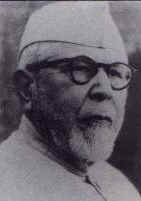
Abdul Majeed Khwaja was an Indian lawyer, educationist, social reformer and freedom fighter from Aligarh. In 1920, he along with others founded Jamia Millia Islamia and later served its vice chancellor and chancellor.
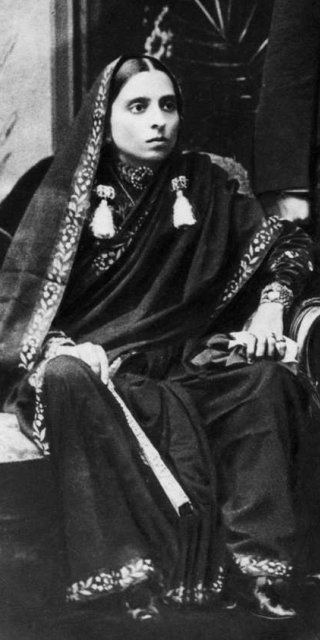
Swarup Rani Nehru was an Indian independence activist. She was the wife of the barrister and Indian National Congress leader Motilal Nehru and mother of India's first prime minister, Jawaharlal Nehru.

Ranjit Sitaram Pandit was an Indian barrister, politician, author and scholar from Rajkot in the Kathiawar region of British India. He is known for his role in the Indian non-cooperation movement, and for translating the Sanskrit texts Mudrarakshasa, Ṛtusaṃhāra and Kalhana's Rajatarangini into English.
References
- ↑ Moraes, Frank (1959). Jawaharlal Nehru: A Biography. Mumbai: Jaico. p. 517. ISBN 9788179926956.
- ↑ Iyengar, A S (2001). Role of Press and Indian Freedom Struggle: All Through the Gandhian Era. New Delhi: APH Publishing. p. 29.
- ↑ Ghose, Shankar (1993). Jawaharlal Nehru: A Biography. New Delhi: Allied Publishers. p. 29. ISBN 9788170233435.
- ↑ Joseph, George Gheevarghese (2003). George Joseph: The Life and Times of a Kerala Christian Nationalist. New Delhi: Orient Longman. p. 103. ISBN 9788125024958.
- ↑ Joseph, George Gheevarghese (2003). George Joseph: The Life and Times of a Kerala Christian Nationalist. New Delhi: Orient Longman. p. 107. ISBN 9788125024958.
- ↑ "Mahadev Desai – The Independent" . Retrieved 30 November 2012.